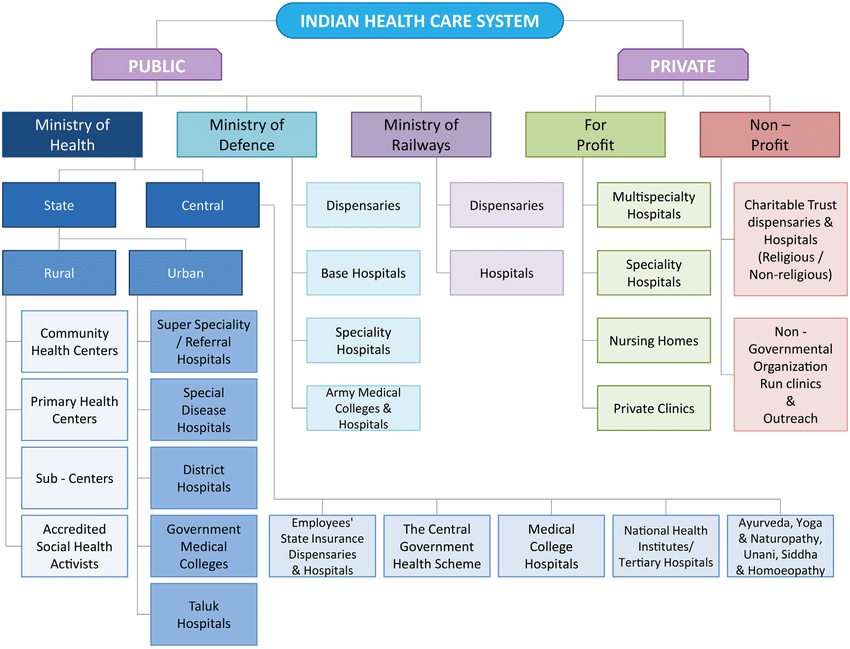Public Health System In India | 27 May 2020
This article is based on “Reset and reform” which was published in The Indian Express on 29/04/2020. It talks about the importance and challenges of the public health system amid Covid-19 pandemic.
Contrary to the popular notion about India’s Public health systems being inefficient and ineffective, it is performing reasonably well in tackling the Covid-19 pandemic and providing treatment of patients without refusing anyone on financial grounds.
However, the private health sector which accounts for 70% of healthcare services in India, is playing only a supporting role and referring the patients to public hospitals for treatment of any cases relating to Covid-19.
The current pandemic reiterates the importance of Public Health systems. Thus, there is a need to address the constraints and revamp of the public health system in India.
Associated Challenges With Public Health Systems in India
- Lack of Primary Healthcare Services: The existing public primary health care model in the country is limited in scope.
- Even where there is a well-functioning public primary health centre, only services related to pregnancy care, limited childcare and certain services related to national health programmes are provided.
- This represents only 15% of all morbidities for which people seek care.
- Supply-Side Deficiencies: Poor health management skills and lack of appropriate training and supportive supervision for health workers prevent delivery of the desired quality of health services.
- Inadequate Funding: Expenditure on public health funding has been consistently low in India (approximately 1.3% of GDP). As per OECD, India's total out-of-pocket expenditure is around 2.3 % of GDP.
- Overlapping Jurisdiction: There is no single authority responsible for public health that is legally empowered to issue guidelines and enforce compliance of the health standards.
- Sub-optimal Public Health System: Due to this, it is challenging to tackle Non-communicable Diseases, which is all about prevention and early detection.
- It diminishes preparedness and effective management for new and emerging threats such as pandemic like Covid-19.
Steps To Be Taken
- Enabling Preventive Care: In order to promote preventive care, the Union government has announced the conversion of primary health care centres into Health and Wellness Centers (HWCs).
- These HWCs will act as the pillar of preventive care and ‘gateway’ for access to secondary and tertiary health services.
- Thus, there is a need to accelerate the establishment of a network HWCs, for this extra funding through Corporate Social Responsibility (CSR) can be mobilised.
- Bringing Behavioural Change: There is a need to ensure people eat right, sleep right, maintain good hygiene, exercise, and adopt a healthy lifestyle that necessitates concerted interventions at various levels of the system.
- In order to catalyse people’s participation for healthy India, there is need for Swasth Bharat Jan Andolan on lines of Swach Bharat Abhiyan.
- Cooperative Federalism: Given the major role that States have to play in creating strong health systems across the country, allocations provided by the Finance Commission can become the critical catalyst for transforming the nation’s health.
- State governments should be incentivized to invest in creating a dedicated cadre for public health at the state, district and block levels.
- More Funding: Public funding on health should be increased to at least 2.5% of GDP as envisaged in the National Health Policy, 2017.
- Decentralisation: There is a need to make nutrition, water, sanitation and hygiene (WASH) part of the core functions of Panchayati raj institutions and municipalities.
- Creating a Nodal Health Agency: There is need to create a designated and autonomous focal agency with the required capacities and linkages to perform the functions of disease surveillance, information gathering on the health impact of policies of key non-health departments, maintenance of national health statistics, enforcement of public health regulations, and dissemination of information to the public.
- In this pursuit, NITI Aayog’s National Health Stack is a step in the right direction, which needs to be operationalised as soon as possible.
Conclusion
Pandemics such as Covid-19 starkly remind us that public health systems are core social institutions in any society. The government has made several efforts to address the shortfall in the public health system through the schemes like the National Medical Commission (NMC) Act, 2019, Pradhan Mantri Bhartiya Janaushadhi Pariyojana, Pradhan Mantri - Jan Arogya Yojana etc.
However, the need of the hour is an adequate investment, for creating a health system that can withstand any kind of public health emergencies, deliver universal health coverage and meet the targets of the Sustainable Development Goals.
|
Drishti Mains Question Critically examine the importance of public health systems in a developing country like India. |
This editorial based on “Think Smarter” which was published in The Indian Express on May 26th, 2020. Now watch it on our Youtube channel.

